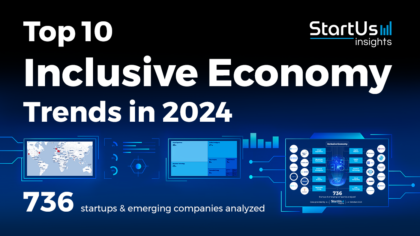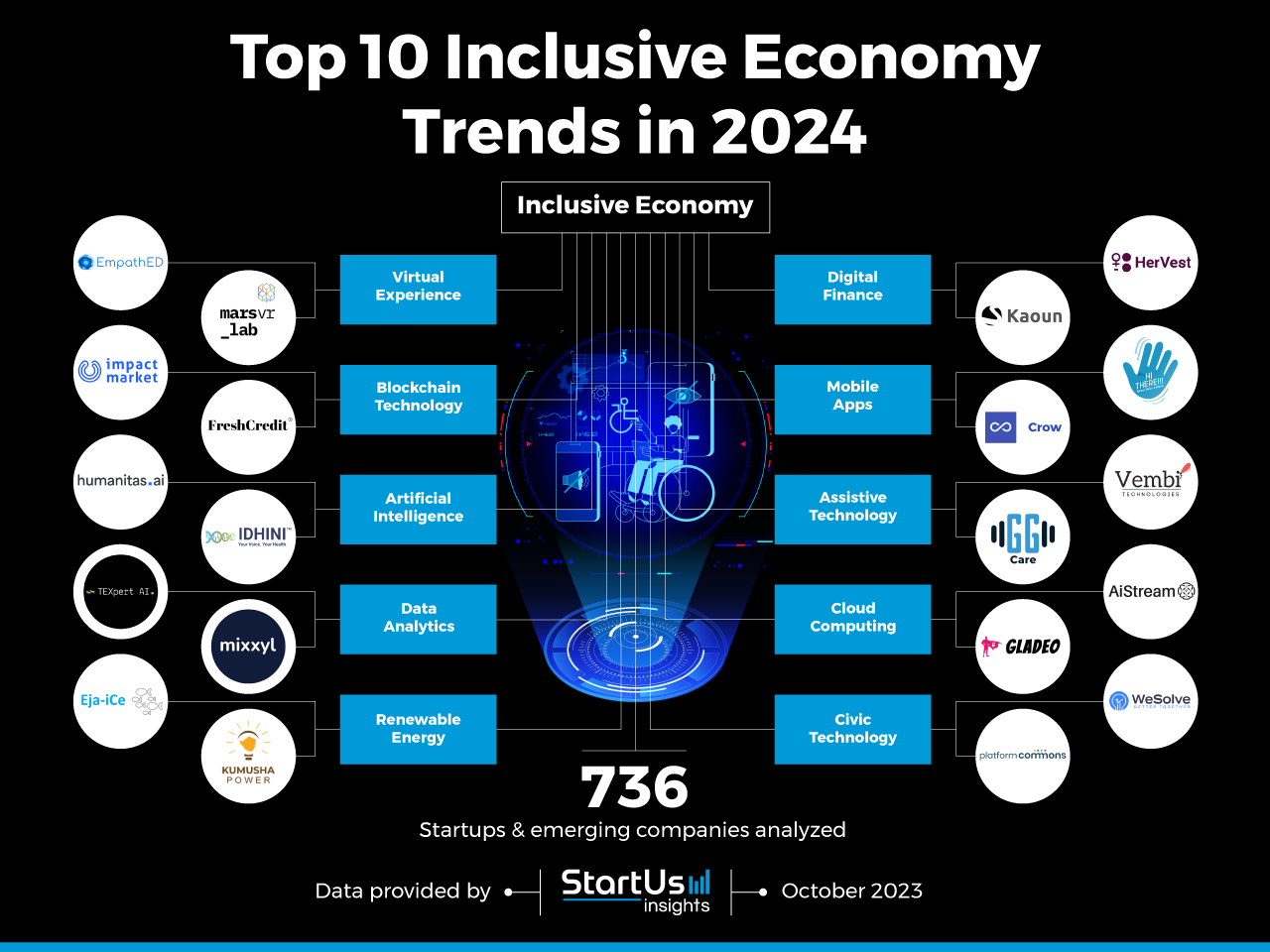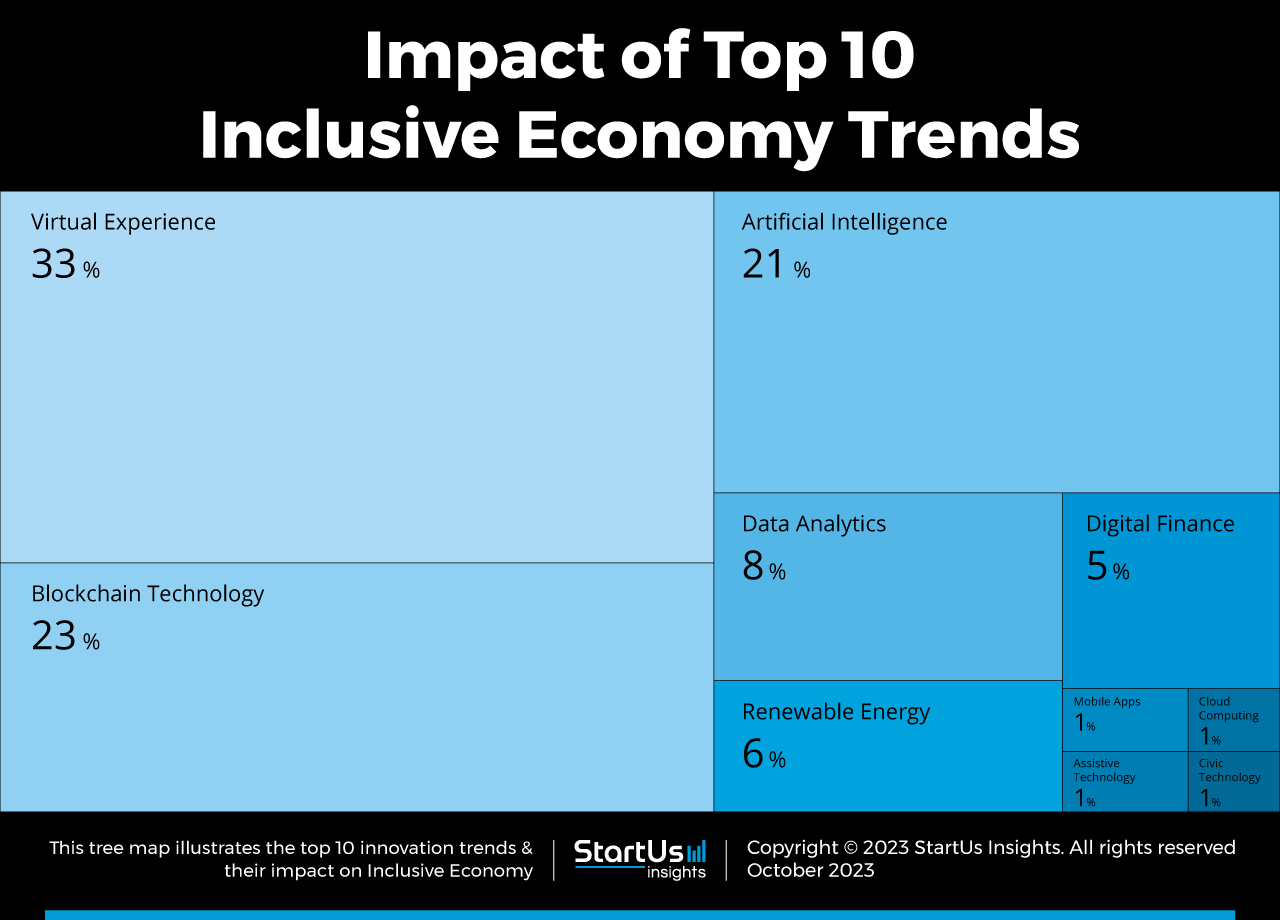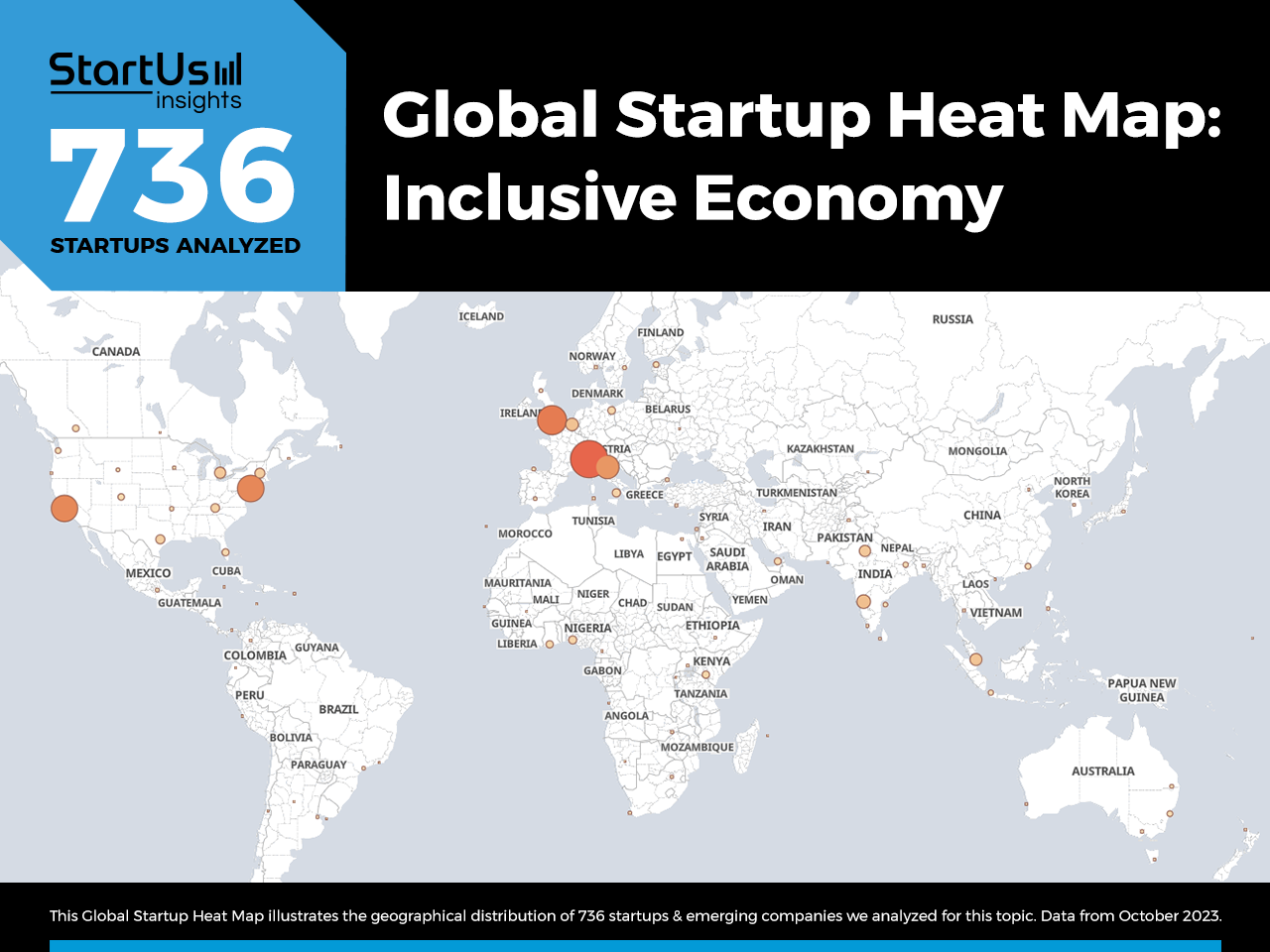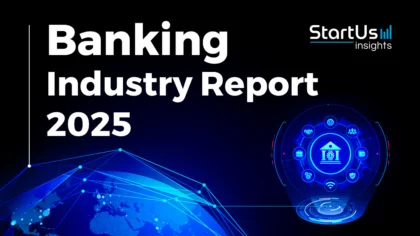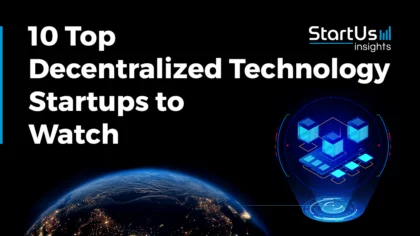Accelerate Productivity in 2025
Reignite Growth Despite the Global Slowdown
Traditional economic models often sideline marginalized communities, leading to vast income inequalities and limited access to resources for a significant portion of the population. However, innovations in inclusive economy technology solve these issues by ensuring that economic growth benefits everyone, irrespective of their socio-economic status.
For example, digital micro-loan platforms that focus on low-income communities and individuals, and AI-driven job matching for underserved populations. These innovations not only promote equitable distribution of wealth and resources but also foster sustainable development, ensuring that no community or person is left behind. The benefits of these advancements range from improved social cohesion to more resilient and diverse economic landscapes.
Top 10 Inclusive Economy Trends (2024)
- Virtual Experience
- Blockchain Technology
- Artificial Intelligence
- Data Analytics
- Renewable Energy
- Digital Finance
- Mobile Apps
- Assistive Technology
- Cloud Computing
- Civic Technology
Innovation Map outlines the Top Inclusive Economy Trends & 736 Promising Startups
For this in-depth research on the Top 10 Inclusive Economy Trends and startups, we analyzed a sample of 736 global startups & scaleups. This data-driven research provides innovation intelligence that helps you improve strategic decision-making by giving you an overview of emerging technologies in the inclusive economy industry. In the Inclusive Economy Innovation Map, you get a comprehensive overview of the innovation trends & startups that impact your company.
These insights are derived by working with our Big Data & Artificial Intelligence-powered StartUs Insights Discovery Platform, covering 3 790 000+ startups & scaleups globally. As the world’s largest resource for data on emerging companies, the SaaS platform enables you to identify relevant technologies and industry trends quickly & exhaustively.
Tree Map reveals the Impact of the Top 10 Inclusive Economy Trends
Based on the Inclusive Economy Innovation Map, the Tree Map below illustrates the impact of the Top 10 Inclusive Economy Trends. Virtual experience platforms provide marginalized communities with access to immersive training and education modules tailored to their unique needs. Blockchain technology and digital finance platforms improve transparency and trust in transactions, especially where traditional banking has limited service or infrastructure. Besides this, AI and data analytics predict market demands in real time, enabling businesses to cater to previously overlooked segments.
Furthermore, renewable energy is not just an environmental imperative but also gives remote communities sustainable power sources to power their homes and businesses. Additionally, mobile apps bridge information gaps, providing health advice and agricultural tips, creating communities that promote social diversity and inclusivity. Assistive Technology is breaking barriers for disabled people, ensuring they participate fully in the economic spectrum. Lastly, cloud computing improves accessibility for small businesses while civic technology fosters participatory democracy, ensuring every voice has a say in economic decisions.
Global Startup Heat Map covers 736 Inclusive Economy Startups & Scaleups
The Global Startup Heat Map below highlights the global distribution of the 736 exemplary startups & scaleups that we analyzed for this research. Created through the StartUs Insights Discovery Platform, the Heat Map reveals high startup activity in Europe and the USA followed by India and Singapore.
Below, you get to meet 20 out of these 736 promising startups & scaleups as well as the solutions they develop. These 736 startups are hand-picked based on criteria such as founding year, location, funding raised & more. Depending on your specific needs, your top picks might look entirely different.
Want to explore all 700+ inclusive economy startups & scaleups?
Top 10 Trends enabling the Inclusive Economy (2024)
1. Virtual Experience
One of the main contributors to income inequality is the lack of access to education and information arising from geographical barriers, the high cost of education, discrimination, and more. Therefore, to prevent economic recession and promote equal development opportunities, startups are advancing technologies that provide access to education and information through virtual media and technology.
For instance, virtual and augmented reality platforms are democratizing education and training enabling individuals from diverse backgrounds to acquire skills and adapt to changing job markets. Additionally, virtual simulations allow businesses to remove social biases through VR-based training scenarios.
Moreover, such AR, VR, and mixed reality (MR) solutions create more inclusive work environments even in remote work. Furthermore, virtual marketplaces are fostering global trade and collaboration, leveling the playing field for entrepreneurs regardless of their geographical location or financial status.
EmpathED fosters Inclusion and Accessibility Training
US-based startup EmpathED develops an online professional development platform emphasizing accessible training on learning disabilities and health impairments. The startup utilizes multimedia and virtual reality to offer training on inclusion, accessibility, disability, and other health concerns across various organizations. Educators, students, and parents benefit from curated micro-courses designed to foster engaging and empathetic learning experiences.
The platform’s virtual reality solution immerses users in scenarios to understand conditions like dyslexia while healthcare professionals also receive training on specific diagnoses. Besides this, corporate sectors benefit from promoting empathetic cultures and ensuring compliance with the Americans with Disabilities Act. This approach not only promotes an inclusive economy but also ensures a holistic understanding of diverse needs.
MARS VR Lab develops a Wheelchair Training System
Canadian startup MARS VR Lab advances rehabilitation through virtual reality, targeting children with disabilities. Its product XPod is a gamified wheelchair training system that uses VR to remove barriers in mobility training for patients and care providers. It features a reward mechanism within the XPod that enhances engagement and encourages participation.
Moreover, the device’s setup requires minimal space, ensuring easy integration into various environments. By simulating the power wheelchair experience, it offers a risk-free and safe virtual environment that promotes inclusivity. This approach combines entertainment and safety, ensuring effective wheelchair training without the fear of physical harm for individuals and healthcare professionals.
2. Blockchain Technology
The financially weaker sections of societies are often subject to financial exclusion, significantly higher interest rates, and penalties, and are susceptible to fraud and corruption. Blockchain technology addresses these issues by providing decentralized finance platforms, extending financial services to unbanked populations, and ensuring broader economic participation.
Transparent and immutable ledgers, inherent to blockchain, are making supply chains more secure, ensuring ethical sourcing and reducing counterfeiting. Moreover, smart contracts on blockchain platforms are automating and securing transactions, minimizing the risk of fraud and enhancing trust among participants. Through these innovations, the financially weaker sections of societies are benefitting from increased transparency, inclusivity, and integrity in financial systems.
impactMarket advances Blockchain-powered Accessible Finance
Portuguese startup impactMarket develops financial solutions for underprivileged individuals through blockchain-driven financial services. Utilizing Web3 technology, the startup creates a decentralized platform where transactions are verified without intermediaries, ensuring direct and efficient transfers. Its Unconditional Basic Income (UBI) is based on the stablecoin Celo Dollar and automatically deposits funds to the crypto wallets of registered users.
While the Libera crypto wallet provides a secure environment for storing and managing digital assets. Besides this, its Microcredit solution employs a peer-to-peer lending model, connecting lenders directly with beneficiaries, fostering trust, and reducing overhead costs.
Additionally, its Microcredit solution supports beneficiaries in their professional and personal growth while the Learn & Earn initiative engages users with educational content while offering rewards. Through these innovations, impactMarket ensures broader access to financial tools and knowledge regardless of their economic status.
FreshCredit provides Decentralized Credit Scoring
US-based startup FreshCredit promotes financial inclusivity through its blockchain-based decentralized credit scoring. FreshCredit’s blockchain-based solutions ensure accurate, immutable, and user-controlled credit data and empower users, granting them control over their financial data.
The startup’s BlockID Reports and BlockScore Insights evaluate creditworthiness without relying on centralized financial institutions to ensure a transparent and inclusive credit assessment system. Moreover, it features big data analytics with an algorithmic, cross-chain non-custodial liquidity pool to match lenders with borrowers. In this way, FreshCredit mitigates the associated financial risks with its secure blockchain solutions and bridges the gap between financial innovation and inclusivity enabling credit access for all.
3. Artificial Intelligence
Traditional economic models face difficulties in identifying marginalized groups, tailoring financial products to diverse needs, and monitoring the effectiveness of inclusion policies. Therefore, to address these widespread issues, startups are developing artificial intelligence (AI) powered solutions. For example, advanced algorithms analyze vast datasets to pinpoint underserved communities to provide targeted support.
AI-driven financial platforms provide customized products, from microloans to insurance, catering to the unique requirements of various demographics. Furthermore, machine learning models evaluate the impact of inclusion strategies in real time, enabling policymakers to refine and optimize their approaches. Through these AI innovations, inclusive economies are becoming more attainable, ensuring that growth benefits are more equitably distributed.
Humanitas AI develops an AI-powered Social Care Supply Chain
Humanitas is a US-based startup that develops AI-powered tools tailored for social impact. Its AI assistant, designed for nonprofit organizations, addresses diverse challenges such as fundraising, donor communication, and grant applications. The assistant learns and adapts to the language and tone of individual organizations, ensuring personalized and efficient assistance.
By automating routine tasks, the AI assistant allows professionals to focus on impactful work, fostering inclusive economies. Besides this, Humanitas’s solution focuses on data privacy with end-to-end encryption and strict policies against the sale of personally identifiable information. The startup’s data autonomy ensures nonprofits retain full control over their data while enhancing the efficiency and reach of social care initiatives, promoting inclusivity and broader societal impact.
Idhini promotes Inclusive Clinical Trial Participation
US-based startup Idhini advances clinical trial participation through its AI platform, DIRA, which employs advanced natural language processing and machine learning. Its AI-driven conversational agent provides answers, reminders, and educational content, ensuring informed participation. DIRA automates recruitment processes such as identification and engagement with a diverse range of candidates.
Moreover, it promotes inclusive clinical trial participation, especially from black, Indigenous, (and) people of color communities (BIPOC). Furthermore, the platform supports multiple languages, ensuring broader reach and engagement with real-time tracking and analytics to enhance the recruitment process, while providing valuable insights. In this way, Idhini fosters inclusive economic growth in the medical and healthcare industries by ensuring diverse and representative clinical trial participation.
4. Data Analytics
Expanding economies increasingly face issues and inconsistencies in accurately measuring disparities, understanding the nuanced needs of diverse populations, and assessing the real-time impact of inclusion-driven initiatives. Innovations in data analytics offer solutions to these through advanced data tools, enabling granular analysis of socio-economic indicators and subtle inequalities often overlooked.
Besides this, predictive analytics forecasts the needs of various segments, allowing for proactive policy formulation. While real-time analytics platforms provide immediate feedback on the effectiveness of inclusion measures. The implementation of data analytics equips inclusive economies to identify gaps, tailor interventions, and ensure that prosperity is equally accessible to all parts of society.
TEXpert AI creates a Data-driven DEI Strategy Platform
UK-based startup TEXpert implements data-driven diversity, equity, and inclusion (DEI) strategies through advanced analytics and AI. The startup’s platform, a unified DEI data analytics SaaS platform uses organizational data to guide hiring and other diversity-related endeavors. By leveraging natural language processing (NLP), the platform ensures precise candidate-opportunity matching, addressing underrepresentation in the workforce.
Additionally, through the use of analytics, it pinpoints gaps in diversity and inclusion across various identity categories, enabling targeted strategies. Furthermore, the platform’s diversity analytics converts workforce data into actionable insights, complementing diversity reports. By setting intelligent DEI targets, the startup’s algorithms identify and match underrepresented candidates to job requirements and promote equitable hiring practices and workforce diversity.
Mixxyl automates Diversity Analytics
UK-based startup Mixxyl improves diversity in recruitment through automated diversity analytics, allowing hiring organizations to focus on diversity based on tangible data. The platform connects with applicant tracking systems to give recruiters insights into the unknown demographics of their candidates and talent pools.
The platform’s AI-powered algorithms analyze data to detect demographics, ensuring unbiased recruitment processes by leveraging diversity data to foster equitable hiring processes. Through its platform, recruiters make informed decisions, promoting equity and inclusion in the hiring landscape.
5. Renewable Energy
Energy poverty is a significant challenge in developing and developed economies which stems from energy access disparities, unaffordable energy costs for low-income communities, and more. Innovations in renewable energy are addressing these through decentralized renewable energy systems, like solar microgrids, which are bringing power to remote and underserved regions.
Furthermore, advances in solar and wind technologies make clean energy affordable for all, alleviating energy poverty. Moreover, transitioning to cleaner energy sources mitigates the adverse environmental impacts that often disproportionately burden marginalized communities.
Eja Ice provides Solar-powered Refrigerators
Nigerian startup Eja Ice provides solar-powered refrigeration and cold chain solutions that primarily serve small and medium-sized enterprises (SMEs), corporates, pharmaceuticals, and food-producing communities. Eja Ice offers diverse service models, including cooling as a service (CaaS) which addresses challenges related to asset ownership.
Its other model Lease to Own accommodates those interested in solar-powered cooling mobility solutions and cold storage freezers. Eja Ice also provides solutions that focus on direct ownership without financial support through its Direct Sale model. Through these offerings, Eja Ice promotes inclusive economies by ensuring access to affordable cooling equipment for low-income businesses and entrepreneurs.
Kumusha Power Zimbabwe creates Affordable Solar Lighting
Ethiopian startup Kumusha Power provides affordable solar lighting solutions with its range of solar home systems, including the d.light D100, D180, and X500. The d.light D100 system includes a solar panel, mobile-charging battery pack, two bulbs, and a tube light.
It also offers additional features like a frequency modulation (FM) radio, torch, and three light switches. The X500 system powers 12V appliances and contains a super-bright tube light, customizable lamp brightness, and optional appliances. These solar solutions not only provide reliable energy but also promote economic inclusivity by making clean energy accessible and affordable.

6. Digital Finance
Financial institutions levy high transaction costs affecting micro and small-scale businesses and lack tailored financial products for diverse and low-income populations. For this reason, startups are providing solutions such as mobile banking platforms and digital wallets which also extend financial services to remote and underserved communities.
Additionally, peer-to-peer lending and digital microfinance institutions are offering low-cost financial solutions to small businesses, fostering entrepreneurship. Additionally, AI-driven digital finance tools are customizing financial products, from savings to insurance, to cater to the unique needs of various demographics. Through these digital finance innovations, inclusive economies are overcoming barriers, ensuring that financial empowerment reaches every individual, regardless of their socio-economic status.
HerVest advances Inclusive Finance for Women
HerVest is a Nigerian startup that focuses on inclusive finance specifically tailored for African women. The digital platform emphasizes financial inclusion using a gender-lens investment approach and offers features like free in-app transfers and zero withdrawal charges.
HerVest’s solution also provides users have the opportunity to invest in dollar-denominated assets, earning interest in the same currency. The startup’s platform enables women to gain insights into their financial personalities and access low-risk investment opportunities. This not only promotes financial growth but also contributes significantly to the broader vision of inclusive economies in developing regions.
Kaoun develops a Financial Services Platform
Kaoun is a Tunisian startup that develops a financial inclusion pipeline for the previously unbanked and underbanked. The startup’s solutions include remote identification (eKYC) through a proprietary identification process that enables remote strong customer authentication (SCA), online payments, and credit solutions. Besides this, Flouci, a mobile wallet, facilitates merchant payments, peer-to-peer transfers, and domestic remittances, targeting those excluded from formal financial systems.
Another product, Botkeji, automates banking processes and ensures real-time access to various banking services. It integrates seamlessly with banks’ software, enhancing efficiency and reducing customer frustration. Kaoun’s innovations bridge the gaps in current financial ecosystems that overlook economically weaker sections of society and improve their financial access.
7. Mobile Apps
Many communities, including the elderly and physically challenged, often lack access to essential services and face neglect in growing economies. Mobile apps are overcoming this through e-learning apps that democratize education, ensuring that individuals, irrespective of their location or physical status, have access to learning resources. Besides this, health and telemedicine apps are bridging the gap between remote communities and essential healthcare services.
Furthermore, e-commerce and marketplace apps provide micro-entrepreneurs with platforms to reach wider audiences and break down traditional barriers to market entry. Through these mobile app innovations, inclusive economies are effectively addressing their challenges, ensuring that opportunities and resources are accessible to all, regardless of geographical or socio-economic constraints.
Hi There Solutions creates a Hearing Disability Communication App
Hi There Solutions is a US-based startup that enhances communication for the deaf and hard of hearing using real-time video call captioning and instant messaging. Its product, Hi There!!!, facilitates video chats with real-time captions, speech-to-text, text-to-speech, and animated audio sign language (ASL) sticker emojis.
Another feature, Just Talk!, is a chat board designed for two-way conversations in various environments. Moreover, the messages are private, support end-to-end encryption, and work on both iOS and Android devices. The platform’s services bridge communication gaps by catering to the deaf and hard-of-hearing community ensuring everyone has equal access to communication tools.
Crow specializes in an Introductory App for Professionals
Crow is a US-based startup that develops an inclusivity-centered mobile platform for introductions about professionals. The startup’s platform offers real-time connections, focusing on genuine conversations over clicks or texts. It allows users to create and verify profiles via LinkedIn, ensuring anonymity to avoid unconscious biases and spotlights skills and interests.
The platform only displays available matches, allows quick audio or video calls, offers 5-minute chats, and shares LinkedIn profiles only if both parties are interested after the call. By prioritizing genuine inclusivity, Crow seeks to eliminate traditional hindrances and biases faced by interviewees and fosters a transparent and equitable networking environment.
8. Assistive Technology
Barriers to workplace participation for individuals with disabilities, limited accessibility to public spaces, and a lack of tailored educational resources for those with special needs. These are a few of the challenges that startups are overcoming through innovations in assistive technology. For example, advanced prosthetics and mobility devices are enabling individuals with physical disabilities to actively participate in the workforce.
Voice recognition software and screen readers are ensuring digital inclusivity for the visually impaired. Moreover, adaptive learning platforms are customizing educational content to cater to diverse learning needs, ensuring that everyone, regardless of their abilities, has access to quality education. Through these assistive technology advancements, inclusive economies are removing barriers and fostering an environment with equal participation.
Vembi Technologies provides an Electronic Braille Reader
Vembi Technologies is an Indian startup that creates an electronic braille reader for visually impaired children. Its product called Hexis automatically transforms text into braille, displayed on a refreshable braille screen. The tool enhances literacy among children with blindness, making reading content available to the children with blindness at par with their sighted peers.
Additionally, it also features age-appropriate content, supports Indian languages, and is a battery-based portable device. The startup also provides the Antara software platform, assisting teachers in content management and assessment. Through such advancements, Vembi contributes to inclusive economies, ensuring equal educational opportunities for all.
GG Care develops an Elderly Care Voice Assistant
GG Care is a UK-based startup that integrates voice-assistive technology into elderly care, especially for those with dementia. The startup converts Amazon Alexa devices into virtual care companions, enhancing the lives of the elderly. Through a web interface and an Alexa Skill, caregivers deliver interactive reminders, called Digital Interventions (DIs). These DIs break tasks into manageable steps, using questions and prompts for clarity.
GG Care promotes independence, social connections, and cognitive rehabilitation, crucial for mental well-being. Additionally, it offers monitoring capabilities, ensuring safety and reducing care costs for the elderly. Moreover, GG Care’s voice-assisted solution prioritizes the well-being and autonomy of the elderly. Through GG Care’s technology, healthcare and elderly care institutions are able to provide better assistance and interventions for the elderly and those with dementia.
9. Cloud Computing
The COVID-19 pandemic and supply chain problems have compounded the high costs of technological infrastructure and scalability constraints for enterprises. Innovations in cloud computing are addressing these challenges by offering affordable, on-demand IT resources through cloud platforms. This allows small to medium enterprises to operate and scale their operations effectively without large upfront investments.
Additionally, remote workers, irrespective of their location, access essential data and applications seamlessly through cloud services, ensuring consistent productivity. Through these cloud computing innovations, inclusive economies are enhancing accessibility, reducing costs, and fostering growth for businesses of all sizes.
AiStream provides a Hyper-local Cloud Platform
UK-based startup AiStream provides hyper-local cloud solutions for underserved digital communities. Its platform delivers content and applications where data remains free for users and supports multiple services tailored to different user needs, all curated in a cloud environment.
The startup’s AiStream Edge leverages the power of modern devices such as smartphones to provide essential apps and content directly from its AiStream Hub without accessing the internet. Lastly, the startup’s AiStream Service Control Center accommodates the delivery of offline and online services with multiple clouds distributed at the edge of networks. This approach ensures that even in areas without internet, individuals and business owners access vital digital services.
Gladeo offers a Workforce Development Platform
US-based startup Gladeo offers a cloud-based workforce development platform called Workforce Ascend Cloud that provides media-driven virtual career services The cloud platform integrates with the Gladeo Career Navigation platform to ensure an engaging client-facing experience and provides advanced tools for case managers.
This enables them to oversee client profiles, assign tasks, and utilize reporting mechanisms with AI-powered accessibility tools to ensure inclusivity. Besides this, the cloud solution emphasizes scalability, allowing career services to expand their reach through online, self-service, and career navigation tools. By connecting clients with relatable role models and career pathways, Gladeo fosters an inclusive economic workforce environment.
10. Civic Technology
Some of the prominent barriers to inclusive economies include limited citizen participation in governance, lack of transparency in public decision-making, and access to essential public services. Therefore, civic technology offers solutions through digital platforms, facilitating direct citizen engagement and individuals to voice concerns, vote on local initiatives, and participate in policy formulation.
Open data portals are enhancing transparency, providing the public with real-time insights into government operations and expenditures. Moreover, online platforms streamline access to public services, from permits to social welfare, ensuring all citizens, regardless of socio-economic status, can avail of essential services. These civic technology advancements are fostering greater civic participation, enhancing transparency, and ensuring equitable access to public resources.
WeSolve promotes Inclusive Community Engagement
WeSolve is a Danish startup that fosters inclusive community engagement through its platform that emphasizes the importance of involving citizens in political, social, and economic decisions. The platform offers a suite of tools for ideation, experience collection, and surveys to gather diverse insights.
It also features a web-based engagement through mobile or desktop and corporate engagement activities through a natural workflow that does not cause any distraction. Besides this, the engagement tool maintains the privacy of citizens, provides news to keep community members informed, and promotes active participation with gamification elements to motivate users.
Additionally, comments and likes facilitate discussions, capturing varied perspectives and preferences that power engagement analytics to draw conclusions and make data-driven decisions. Moreover, the startup citizen engagement solutions emphasize democratic participation, ensuring every voice contributes to sustainable progress.
Platform Commons develops a Volunteer Engagement Platform
Indian startup Platform Commons develops a community engagement platform that serves as an all-in-one volunteer solution, including a multi-sided volunteer marketplace and a fellowship suite. The platform provides tools for volunteer project management, community forums, and learning management.
It also features unique volunteer profiles and certificates that recognize contributions, while impact measurement tools track societal benefits. Besides these, beneficiary management ensures that volunteers’ efforts directly reach those in need. Platform Commons’ software-as-a-service solution gives governments, non-profits, and social enterprises a platform to engage with communities and solve socioeconomic problems.
Discover all Inclusive Economy Trends, Technologies & Startups
Innovations such as adaptive urban infrastructure, personalized digital education tools, and community-driven digital marketplaces are fostering more inclusivity. Moreover, virtual reality, robotics, and remote collaboration tools are enabling individuals with disabilities to participate in the workforce. These advancements foster inclusivity and also promote sustainable economic growth for the broader society.
The inclusive economy trends and startups outlined in this report only scratch the surface of trends that we identified during our data-driven innovation & startup scouting process. Identifying new opportunities & emerging technologies to implement into your business goes a long way in gaining a competitive advantage.
